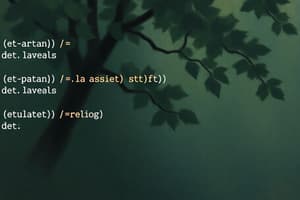Podcast
Questions and Answers
What is the purpose of an operator in programming?
What is the purpose of an operator in programming?
- To define variables
- To declare functions
- To perform operations (correct)
- To comment code
Which type of operator is used to add two operands?
Which type of operator is used to add two operands?
- Shift Operator
- Logical Operator
- Arithmetic Operator (correct)
- Assignment Operator
What does the precedence of an operator determine?
What does the precedence of an operator determine?
- The evaluation order of operators (correct)
- The direction in which the code is read
- The order in which variables are declared
- The style of commenting in the code
In the expression int value = 10+20*20;, why is the value 210?
In the expression int value = 10+20*20;, why is the value 210?
Which type of operator is used to find the remainder of a division operation?
Which type of operator is used to find the remainder of a division operation?
What is the role of a bitwise operator?
What is the role of a bitwise operator?
'!' is an example of which type of operator?
'!' is an example of which type of operator?
'=' is an example of which type of operator?
'=' is an example of which type of operator?
'>>' and '<<' are examples of which type of operators?
'>>' and '<<' are examples of which type of operators?
'?:' is an example of which type of operator?
'?:' is an example of which type of operator?
Which operator has the highest precedence among the following?
Which operator has the highest precedence among the following?
What is the purpose of the sizeof operator in C?
What is the purpose of the sizeof operator in C?
In the expression 'A' + 2, what is the result considering 'A' has an ASCII value of 65?
In the expression 'A' + 2, what is the result considering 'A' has an ASCII value of 65?
What is the correct associativity of the unary operators in C?
What is the correct associativity of the unary operators in C?
How does the comma operator function in C expressions?
How does the comma operator function in C expressions?
If an expression contains multiple operators at the same precedence level, how are they associated?
If an expression contains multiple operators at the same precedence level, how are they associated?
What is the purpose of the modulus (%) operator in C?
What is the purpose of the modulus (%) operator in C?
'-a + b / 5' is an example of which type of operator usage in C expressions?
'-a + b / 5' is an example of which type of operator usage in C expressions?
'A++ - B' is considered an invalid expression due to:
'A++ - B' is considered an invalid expression due to:
What is the next step after binding unary operators to their operands in the given expression?
What is the next step after binding unary operators to their operands in the given expression?
Which operators have the highest precedence according to the explanation given?
Which operators have the highest precedence according to the explanation given?
What type are the variables a, b, c, ct, e, and f in the context of the explanation?
What type are the variables a, b, c, ct, e, and f in the context of the explanation?
What does the C language not specify regarding the order of evaluation of sub-expressions?
What does the C language not specify regarding the order of evaluation of sub-expressions?
Which function is used to read a single character from the keyboard in C?
Which function is used to read a single character from the keyboard in C?
What is the purpose of putchar() function in C?
What is the purpose of putchar() function in C?
Gets() function in C is used for __________.
Gets() function in C is used for __________.
Puts() function in C is primarily used for __________.
Puts() function in C is primarily used for __________.
What is the main focus of input operations in programming?
What is the main focus of input operations in programming?
What type of operation does an Arithmetic operator perform?
What type of operation does an Arithmetic operator perform?
Which operator in C is used to increment a value by 1?
Which operator in C is used to increment a value by 1?
In the expression 'int value = 10 % 3;', what will be the value stored in the 'value' variable?
In the expression 'int value = 10 % 3;', what will be the value stored in the 'value' variable?
What is the precedence of the '*' operator compared to the '+' operator in C?
What is the precedence of the '*' operator compared to the '+' operator in C?
Which operator in C is used for performing logical AND operations?
Which operator in C is used for performing logical AND operations?
What is the purpose of the '?:' operator in C?
What is the purpose of the '?:' operator in C?
Which type of operator is used to compare two values for equality in C?
Which type of operator is used to compare two values for equality in C?
What is the precedential relationship between relational and bitwise operators in C?
What is the precedential relationship between relational and bitwise operators in C?
In C programming, what is the purpose of the modulus (%) operator?
In C programming, what is the purpose of the modulus (%) operator?
What is the main focus of input operations in programming?
What is the main focus of input operations in programming?
Which function is primarily used to display a string on the screen in C programming?
Which function is primarily used to display a string on the screen in C programming?
What is the purpose of the putchar() function in C programming?
What is the purpose of the putchar() function in C programming?
Which type of operator is used to read a single character from the keyboard in C?
Which type of operator is used to read a single character from the keyboard in C?
What does the Gets() function in C primarily do?
What does the Gets() function in C primarily do?
'>>' and '<<' are examples of which type of operators?
'>>' and '<<' are examples of which type of operators?
'=' is an example of which type of operator?
'=' is an example of which type of operator?
'!ct + e' is an example of which type of operator usage in C expressions?
'!ct + e' is an example of which type of operator usage in C expressions?
In evaluating the arithmetic expression -a + b * c - d + e + f, what is the first step as per the explanation provided?
In evaluating the arithmetic expression -a + b * c - d + e + f, what is the first step as per the explanation provided?
Which type of operator has the highest precedence as per the explanation?
Which type of operator has the highest precedence as per the explanation?
Why is the expression 'a++ - b' considered invalid based on the explanation provided?
Why is the expression 'a++ - b' considered invalid based on the explanation provided?
What is the purpose of using spaces between operands and operators in C expressions according to the text?
What is the purpose of using spaces between operands and operators in C expressions according to the text?
Which type of operator operates on two operands in C expressions?
Which type of operator operates on two operands in C expressions?
What does the expression 'A' + 2 evaluate to as per the ASCII value provided in the text?
What does the expression 'A' + 2 evaluate to as per the ASCII value provided in the text?
Why is it important to follow precedence and associativity rules when evaluating complex arithmetic expressions in C?
Why is it important to follow precedence and associativity rules when evaluating complex arithmetic expressions in C?
Which operator is used to find the memory space allocated for different data types in C?
Which operator is used to find the memory space allocated for different data types in C?
Flashcards are hidden until you start studying





